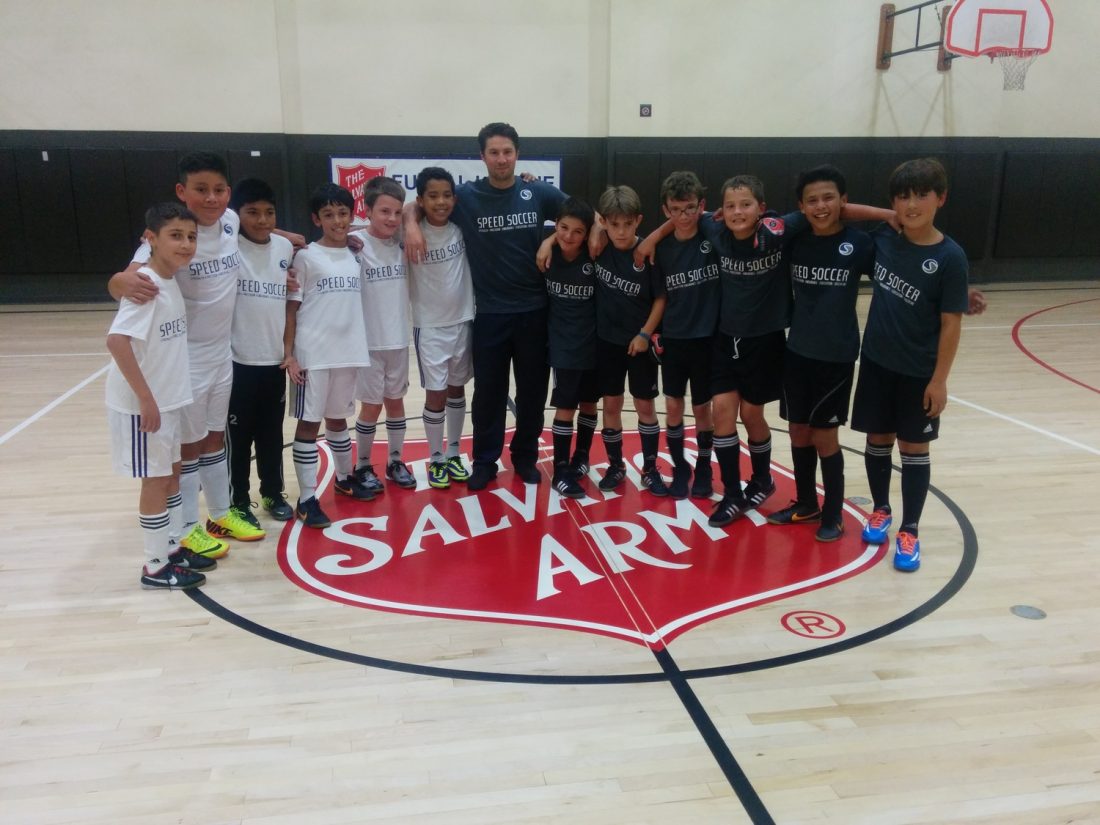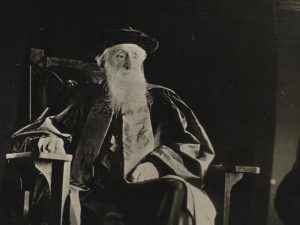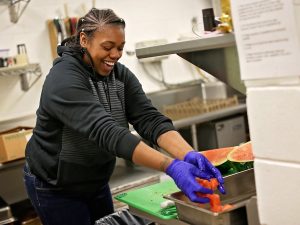Advocates believe there’s a powerful link between sport, service and spirituality.
“Sport has the power to change the world,” the legendary South African activist Nelson Mandela once said. “It has the power to inspire. It has the power to unite people in a way that little else does. It speaks to youth in a language they understand.”
Indeed, The Salvation Army believes so strongly in the power of sport, fitness and play as a uniting force, that it has a dedicated sports ministry desk at its International Headquarters in London, from which hundreds of programs and initiatives are coordinated globally each year.
“As a movement, we have raised the profile of sport as an arena for mission,” said Major Keith Pike, International Youth Secretary. “By empowering many Salvationists as they connect their passion for Jesus with their love of sport, we can provide opportunities of ministry, open new doors and develop new relationships.”
Among those important relationships are community partnerships and support from donors and volunteers who likewise understand that The Salvation Army can offer the broadest reach and ability to make an impact—particularly with youth in some of the most vulnerable and underserved areas around the world.
The Salvation Army Bellwood Boys and Girls Club is an example of how effective those partnerships can be in putting that promise to work. It’s one of the local clubs that participates in a co-ed flag football league for six- to 14-year-olds on the Westside of Atlanta, one of the city’s most impoverished communities.
The Westside league has grown from 40 kids and four teams to more than 450 kids and 55 teams this past year. Many of the participants might not otherwise have the opportunity to play organized sports, and this league gives them the chance to do that at no cost to their families. The uniforms, cleats and flags are provided. Last summer, a new turf football field was installed at the Bellwood Club, made possible by a $250,000 grant courtesy of the NFL Foundation, Atlanta Falcons and The Arthur M. Blank Family Foundation.
But sometimes community partnerships come from what might seem like unlikely sources, such as local police departments, just as play can be made possible in unexpected places—with enough imagination.
“One particular corps that champions and has embraced sports for the local community is Manchester Central Corps,” Pike said. “Just under 18 months ago, the corps partnered with Greater Manchester Police (GMP), a Manchester housing association called S4B, which provides workers, and Manchester Young Community Champions, which provides a Youth Support Worker, to create a youth club for the children of the local community.”
He said there are more than 90 children who participate, ages 8 to 14. About 30 to 40 attend each week, choosing to ditch the digital and get into the great outdoors.
That’s a big deal, because more than a third of teens in England are considered “extreme internet users”—engaging online more than six hours a day—according to the Educational Policy Institute think tank. By way of comparison, more than nine-in-10 U.S. teens ages 13 to 17 say they have access to a smartphone or use social media, according to a 2018 Pew Research Center survey, prompting 65 percent of American parents to worry their kids are spending too much time online.
The Manchester youth club, now known as the Lighthouse Club thanks to a rename by the children who attend, is free of charge and takes place every Monday after school.
“The Lighthouse Club aims to get children into sport, but isn’t exclusively sport,” said Captain Kay Blues, Corps Officer at Manchester Central Corps in the U.K. “There’s an 80:20 split with other activities, including arts and crafts. We have carried out activities like litter picking and planting bulbs—anything that can teach life skills and give the children something else to talk about other than TV and video games.”
Blues said the emphasis is on getting the kids outside, active and moving, and to have regular, positive interactions with police officers who attend and participate. Similar programs have cropped up in the U.S., such as a youth basketball program in Durham, North Carolina, which aims to help kids see officers as mentors rather than figures to fear.
The new venture in Manchester has proven to be a success for the corps as well, with many of the children now attending the weekly scout group, families making use of the foodbank, and parents setting up their own group while their children participate in the Lighthouse Club activities.
‘It’s not just for kids.’
Back here in the United States, Salvation Army Western Territory Healthy Army Director Kara Cline is hopeful that the ministry will only continue to grow thanks to the Healthy Army and Kids Fit Go initiatives available for families and kids, respectively.
“People often think of the Kroc Centers as the focus of our sports and fitness ministry,” she said. “But it’s just one of the places we do it. It can really be done anywhere.”
The network of Ray and Joan Kroc Corps Community Centers, started by Joan Kroc in San Diego, California, with a $1.5 billion donation to The Salvation Army, can now be paired with the Kids Fit Go guidebook, which was recently updated and is made available to all Salvation Army locations. Cline said the guidebook has a new mental health component to help provide skills training for resilience in addition to other pillars that focus on nutrition and healthy fitness habits.
“The goal is to help provide the tools the kids will need to handle stress and anxiety,” she said.
Of course, it’s not just kids who can benefit.
“Whether you are a child, a teenager, an older person, an athlete, a coach, a parent, an official or a professional athlete, you all have a part to play in making disciples for Christ in sport and play,” Pike added.
Eric Riddle, a lifelong athlete, took that notion to heart when he developed the Salvation Sports League in Southern California.
It was fall 2013 when Riddle experienced what he calls a “divine intervention” that led him to a chance meeting with Major Darren Norton, the former corps officer at The Salvation Army Pasadena Tabernacle Corps in Pasadena, California, and who now serves in San Francisco.
What started as a one-day-per-week indoor futsal league with five teams has grown to 40 teams with more than 250 people from Pasadena and the surrounding areas participating five days a week.
The best part? Players of all ages can sign up for 10-week sessions at a time. Games last for 40-minutes each and are played at The Salvation Army facilities in Pasadena and Glendale.
A lifetime commitment to sport and fitness is something Riddle is most passionate about sharing.
“I started soccer when I was five years old,” he said. “The joy that it’s given me eventually turned into running my own soccer (futsal) league for adults and youth on both sides. Teaching kids the game that I love and grew up with is so special. You get a great workout and also that community is there as well.”
It’s not an overstatement to say the community created by Riddle’s weekly games was life-changing for Robert Thor. Originally from Iceland, Thor was encouraged to start playing futsal with the league by Riddle in 2016 and he became more plugged in to other parts of ministry as well, including volunteering as a bell-ringer at Christmas time.
“We instantly started bonding and became friends,” Thor said. “He was a source of support while I went through my trials of assimilation, immigration and divorce. When my family in Iceland failed, he was there to pick me up.”
He said at a particularly low point, Riddle even took him in when he was without shelter.
“Finding the church through Eric’s Salvation Sports has allowed me to walk the route to develop a direct and personal relationship with Jesus and through him, God,” Thor added. “I simply owe him my salvation and the assurance that I’m a servant for a greater purpose.”
It is that assurance that keeps Pike and sports ministry leaders around the world committed to bringing sports to communities, building new connections and relationships in the process.
“As people are seeking to serve the need in their communities, in many cases, sport can help address ‘the need’, whether it be fatherlessness, broken homes, lack of leaders, boredom or community dislocation,” he said. “People all over the world are committed to making disciples who can pass on their faith actively and genuinely, and through sport and play there’s huge potential. Five billion people love it, play it and watch it. We just need to know how best to share the vision.”
That vision is perhaps summed up best by Mandela himself: “Sport can create hope where once there was only despair.”
Do Good:
- Visit westernusa.salvationarmy.org to find The Salvation Army nearest you and consider volunteering to coach soccer, flag football, basketball or another sport.
- The Salvation Army has sports ministry specialists around the world. Find and connect with local leaders in your area.
- Learn more about The Salvation Army’s network of Ray and Joan Kroc Corps Community Centers.
- Give to support the fight for good in your community.
- Subscribe to The Do Gooders Podcast with Christin Thieme to find tangible tips for simple actions you can take today to help keep your community going strong.












